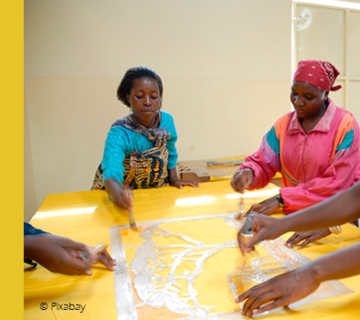The Word of Life for September invites us to be servants of all. It is the condition for being the first. If we want to be great, we must make ourselves small in front of our brothers and sisters, attend to their needs, be there for them.
If he who is Lord and Master washed the feet of others (it was a task performed by slaves), we who want to follow him, especially if we are hold positions of responsibility, are called to serve our neighbours with just as much concreteness and dedication.
This is one of the paradoxes of Jesus’ life. We can understand it only if we reason that the characteristic attitude of Christians is love, a love that leads them to put themselves in the last place, to become smaller than the other, as a father does when he plays with his little girl or when he helps his older son with his homework.
Vincent de Paul called the poor his “masters” and as such he loved them and served them because in them he saw Jesus. Camillus de Lellis tended the sick, washing their wounds and making their beds “with the same affection,” he wrote, “that a loving mother has for her only child who is ill.[1]”
Closer to our times how can we not remember Blessed Teresa of Calcutta who bent down to help thousands of dying people, making herself “nothing” in front of each one of them, the poorest of the poor?
“Making ourselves small” in front of others means trying to enter as deeply as possible into their minds and hearts to the point of sharing their sufferings or their interests, even when these things might seem to be of little importance, or even insignificant to us, while for them they are everything at that moment. …
“To live the other” means, therefore, that we cannot lead lives focused on ourselves, being filled with our own worries, our own concerns, our own ideas, and all that has to do with us.
We need to forget ourselves, to put ourselves aside in order to pay attention to the other person, to make ourselves one with all our neighbours to the point of reaching them in their actual situation and lifting them up. We need to help them come out of their fears and worries, sufferings, complexes and disabilities, or simply to help them come out of themselves and go towards God and towards their brothers and sisters. This helps us find together the fullness of life and true happiness.
People in government too, and those in public administration, (“leaders”) at every level, can also fulfil their responsibilities as a service of love, so as to create and safeguard the conditions that allow love in all its forms to blossom. …
From the moment we get up in the morning until we go to bed at night, at home, in the office, at school and in our neighbourhoods, we can always find opportunities to serve and to be grateful when we ourselves are served by others.
Let’s do everything for Jesus in our brothers and sisters, without neglecting anyone, but always taking the initiative in loving. Let’s serve everyone! It’s only then that we are “great.”
Chiara Lubich
(Chiara Lubich, in Parole di Vita, [Words of Life] edited by Fabio Ciardi, Opere di Chiara Lubich, [Works of Chiara Lubich] Città Nuova, Roma, 2017, pp. 717-719)
[1] Cf. Scritti di San Camillo, [Writings of St Camillus] Il Pio Samaritano, Milano-Roma 1965, p. 67.


 Italiano
Italiano Español
Español Français
Français Português
Português




Condivido tutto questo . se ogni donna o uomo che sia non impari Umilta , la mitezza e la generosita verso gli altri non e nulla. Anche ascoltando l’ altro e carita’. Umilta ci rende forti.